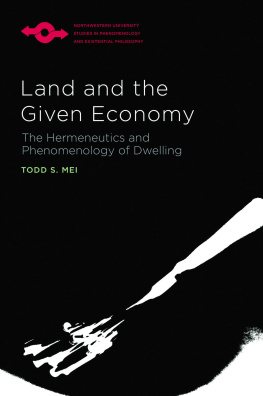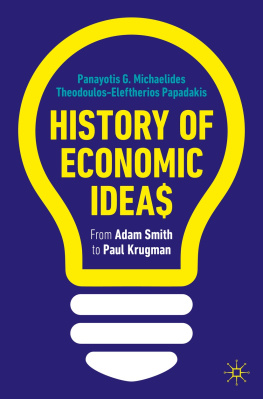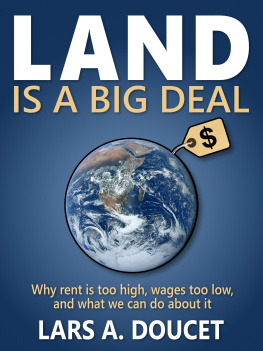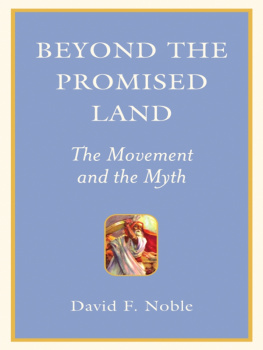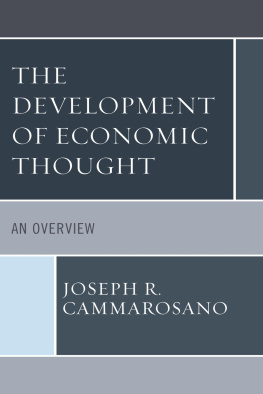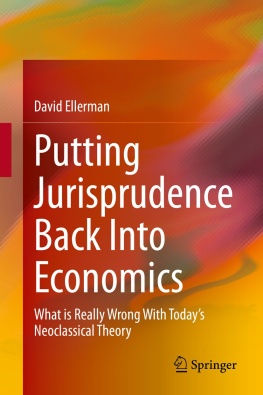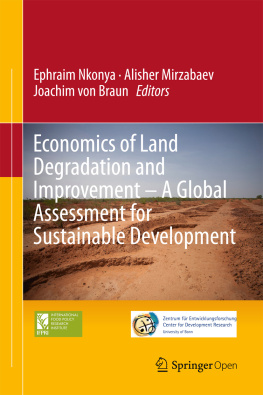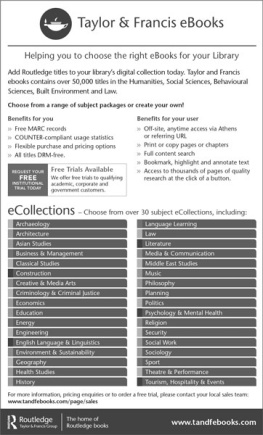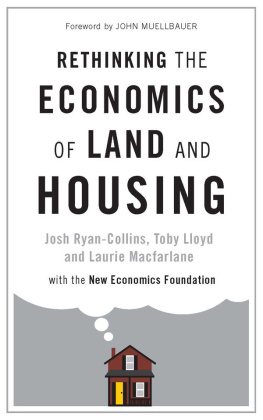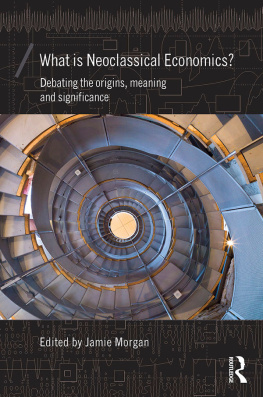Todd S. Mei
Copyright 2017 by the Northwestern University Press. Published 2017. All rights reserved.
Names: Mei, Todd S., author.
Title: Land and the given economy : the hermeneutics and phenomenology of dwelling / Todd S. Mei.
Other titles: Northwestern University studies in phenomenology & existential philosophy.
Description: Evanston, Illinois : Northwestern University Press, 2017. | Series: Northwestern University studies in phenomenology and existential philosophy
Identifiers: LCCN 2016044883 | ISBN 9780810134072 (cloth : alk. paper) | ISBN 9780810134065 (pbk. : alk. paper) | ISBN 9780810134089 (e-book)
Subjects: LCSH: Land useEconomic aspects. | Land tenureEconomic aspects. | EconomicsPhilosophy. | Rent (Economic theory) | Phenomenology.
A note to the reader: This e-book has been produced to offer maximum consistency across all supported e-readers. However, e-reading technologies vary, and text display can also change dramatically depending on user choices. Therefore, you occasionally may encounter small discrepancies from the print edition, especially with respect to indents, fonts, symbols, and line breaks. Furthermore, some features of the print edition, such as photographs, may be missing due to permissions restrictions..
This book is a result of years spent pondering what close friends of mine referred to as the land question, which was posed to me as a problem more important than typical metaphysical, epistemological, or existential questions. The land question was, however, never put formally as a specific question but more in terms of a contradiction in which something essential to all humankind is allowed in most instances to be withheld from general use by conventions of ownership. But rather than pursuing a trajectory of rights and private property, the land question led to matters of economic relations and the philosophical and theological meanings presupposed in those relations. With land always in the background of my research, I soon found what I hope is a coherent and compelling philosophical account of why land matters in ways that we have not really considered.
But how is research able to continue if not by the many kinds of support and encouragement?
I should first like to express my gratitude to the two philosophers who made it possible for me to continue in this profession after receiving my Ph.D. Laurence Goldstein (19472014) and Julia Tanney were essential in supporting my teaching career in philosophy at the University of Kent, U.K. I thank you for having confidence in my abilities as a philosopher and teacher.
The majority of this book was written in conversation with my colleagues at the University of Dundee, U.K. (201214). The most productive talks were certainly the informal oneswhen peering through the office door to say hello, which led eventually to philosophical discussion. Nicholas Davey, Jennifer Gorrod, Lorens Holm, Beth Lord, Mary Modeen, Andrew Roberts, Brian Smith, Dominic Smith, Jim Thompson, James Williams, and Ashley Woodward are ideal interlocutorscritical yet charitable. My sincere thanks for the years of collegiality and discussion you provided.
Prior to Dundee, I taught philosophy at the University of Kent (200812), where my colleagues provided me with a healthy dose of analytic philosophyrigorous but not dogmatic. My thanks to Tom Angier, David Corfield, Laurence Goldstein, Simon Kirchin, David Marjoribanks, Sean Sayers, Julia Tanney, Robin Taylor, Alan Thomas, Kenneth Westphal, and Matthew Whittingham for the many discussions, most memorable of which are perhaps the ones on MacIntyre. Outside of the Kent Philosophy Department, my thanks to Jeremy Carrette, Benot Dillet, Laurence Hemming, and Iain Mackenzie.
George H. Taylor and Pamela Sue Anderson were, as always, persistent sources of support, advice, and dialogue. Though little of Paul Ricoeurs philosophy figures in this book, their work in that field has been a productive source for guiding my own research. Moreover, both have been outstanding mentors.
Not being myself an economist, the help of Nicolaus Tideman and Francis Peddle was invaluable. The 2011 Symposium on Global and Economic Justice at Virginia Tech introduced me to wider circles of academic debates on the nature of land.
I have enjoyed the discussions with Robert Scharff on Heidegger over the years. I am not sure Bob will approve of what I have attempted to do with Heideggers thought, but such is the contingency of being and thinking! Boyd Blundell, with his ability for public outreach in view of questions of justice and ethics, has been an admirable source of philosophical supportoften turning my complex theories into more palatable viewpoints when in general discussion with others.
I would like to thank Jeff Malpas and Till Dppe for their insightful and helpful reviews. I hope I have responded to your comments sufficiently. I would also like to thank the blind reviewers involved at various stages during the completion of this book. I benefited from their economic and analytical philosophical criticism.
My thanks to the Philosophy Department at Manchester Metropolitan University, U.K. (2010), the Economics Department at the University of Buckingham, U.K. (2011), and the Centre for Critical and Cultural Theory (Cardiff University, U.K., 2015) for inviting me to present talks relating to phenomenology and economics.
My parents have been faithfully supportive of my researchfor what reasons I dont know why! I have benefited from a lifetime of their generosity and love.
For helping immensely to keep me sane within the circus classicus that is academia, my deepest gratitude to my wife, Patricia Baker. Much of the keeping me sane involved her introducing me to the skillful embodied coping known as windsurfing.
And so, my thanks also to the Wild Times Windsurfing and Sailing School (Whitstable, U.K.), Jason Wild, Ian Wild, Stuart France, Wendy Fitzpatrick, Rupert Kilburn, Rhi Wilmott, and Nick Pardoe for their encouragement and excellent windsurfing tuition while on the shark-infested waters of the Thames Estuary. It all kept me even-keeled throughout the writing of this book.
Essential funding for this book was made possible by the Robert Schalkenbach Foundation (New York). It has been a pleasure working with Mark Sullivan over the years.
Land and the Given Economy
Give me enough of that [land] and Id fear no onenot even the Devil himself!
Pahom from How Much Land Does a Man Need?
Leo Tolstoys story of the peasant Pahom culminates in a journey to a foreign village where he is given the opportunity to acquire as much land as he can circumambulate in one day. Taken by the prospect of owning as much as possible, he dies from exhaustion just when reaching the point at which he began. The story may read like a fable about avarice, but it has the quality of a philosophical thought experiment when considered more discretely in relation to the nature of land and its role in human existence. This is because Tolstoys narrative is not simply a cautionary tale about Pahoms obsession about a means to wealth. Rather, Tolstoy provides a reflection on the fundamental human relation to land as the source of livelihood and production as well as the kinds of practices and conventions that allow for a distortion of this relation. Consider, for instance, how Pahom is a dedicated learner when it comes to land. As Tolstoy recounts, Pahom graduates from a mode of communal usage, to exclusive possession, to freeholding, and finally to speculation. Consider as well, how by this movement, what used to be the source of life is its opposite: land, the source of production and wealth, is the very thing that becomes the source of death. Tolstoy presents us with a peripeteia (reversal) that is philosophically invigorating. And this reversal has every bit to do with the way in which Pahoms movement of understanding only

